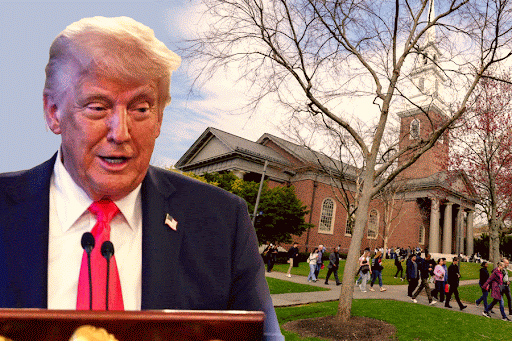The Donald Trump administration now says that the letter to Harvard over alleged antisemitism on campus, that has triggered a confrontation with the Ivy League varsity, was sent by mistake.
The New York Times early on Saturday India time quoted officials as saying that the April 11 letter sent by the officials was "unauthorised".
As reported by NYT, the letter was emailed to Harvard by Sean Keveney, the acting general counsel of the Department of Health and Human Services and a member of Donald Trump’s antisemitism task force.
It outlined a series of directives concerning the university’s hiring, admissions, and curriculum policies — demands Harvard officials described as astonishing in their overreach.
The university, one of America’s most prestigious institutions, formally rejected the administration’s demands on Monday.
Yet, just as Harvard went public, a Trump administration official placed a “frantic” call to Harvard, claiming the letter “should not have been sent” and was “unauthorised,” according to two people familiar with the matter, as cited by The New York Times.
The confusion didn’t end there.
While the content of the April 11 letter was real, there were diverging narratives inside the administration about how and why it was sent.
Some White House insiders believed the letter had been issued prematurely, while others said it had been meant for internal task force circulation and not external dispatch to Harvard.
These details were reported by three sources briefed on the incident, who requested anonymity due to the sensitivity of internal discussions, per The New York Times.
For two weeks before the letter, Harvard had been in dialogue with Trump’s task force. According to NYT, lawyers representing the university William Burck and Robert Hur were in talks with three administration officials: Josh Gruenbaum from the General Services Administration, Thomas Wheeler from the Department of Education, and Keveney himself.
During these talks, the Trump administration had aired its concerns about antisemitism and other issues on campus but had yet to make specific demands.
Harvard’s legal team was told to expect a more detailed letter by Friday. But by the end of the working day, no such letter arrived.
Instead, an email landed overnight.
It was from Keveney. And it wasn’t just more detailed — it was, in Harvard’s view, an ultimatum.
The university went public with its rejection on Monday.
Just hours later, the legal and financial pressure from the administration intensified: billions in federal funding were frozen, and threats surfaced about revoking the school’s tax-exempt status and ability to enrol foreign students.
Gruenbaum contacted Harvard’s legal team, initially claiming neither he nor Wheeler had authorised the letter. According to NYT, he later softened his stance, saying the letter was meant to be sent eventually but not yet, not while the dialogue was still “constructive.”
A similar call was also placed to Columbia University around the same time, as the task force had reportedly been in talks with that institution as well.
Harvard pushed back strongly against the notion that the letter could be considered anything less than official.
“The letter was signed by three federal officials, placed on official letterhead, was sent from the email inbox of a senior federal official and was sent on April 11 as promised,” Harvard said in a statement on Friday.
The university statement added: “It remains unclear to us exactly what, among the government’s recent words and deeds, were mistakes or what the government actually meant to do and say. But even if the letter was a mistake, the actions the government took this week have real-life consequences” on students, employees, and “the standing of American higher education in the world.”
In response, the Trump administration maintained that it stood by the letter’s content.
A senior White House official described Harvard’s public defiance as “overblown,” blaming the university for halting talks instead of resolving the issue privately.
“It was malpractice on the side of Harvard’s lawyers not to pick up the phone and call the members of the antisemitism task force who they had been talking to for weeks,” May Mailman, the White House senior policy strategist, told The New York Times. “Instead, Harvard went on a victimhood campaign.”
Still, Mailman offered a conditional olive branch, stating there remained “a potential pathway” to resume talks if Harvard agrees to meet Trump’s demands and, among other things, apologises to its students for allowing antisemitism on campus.










